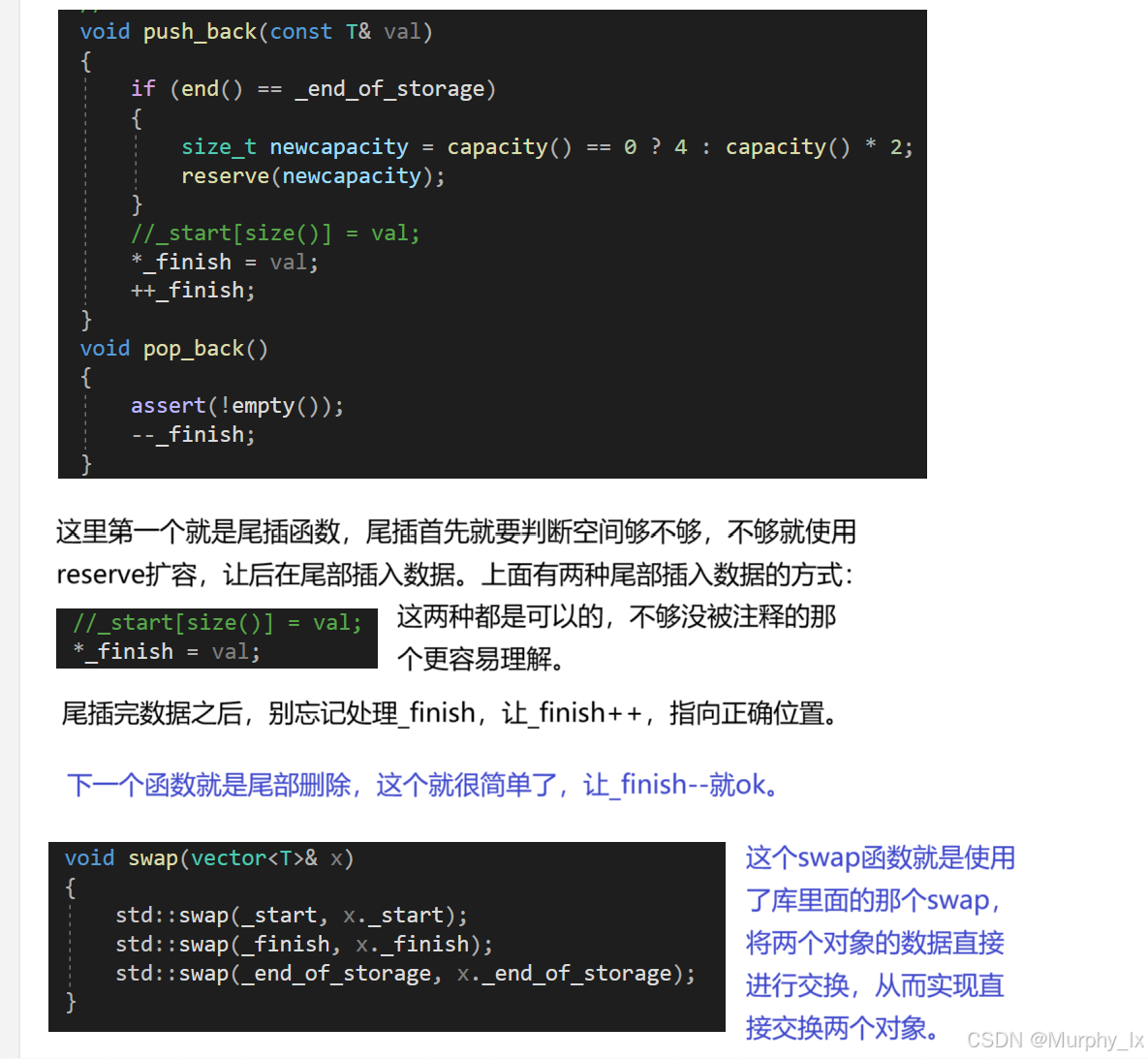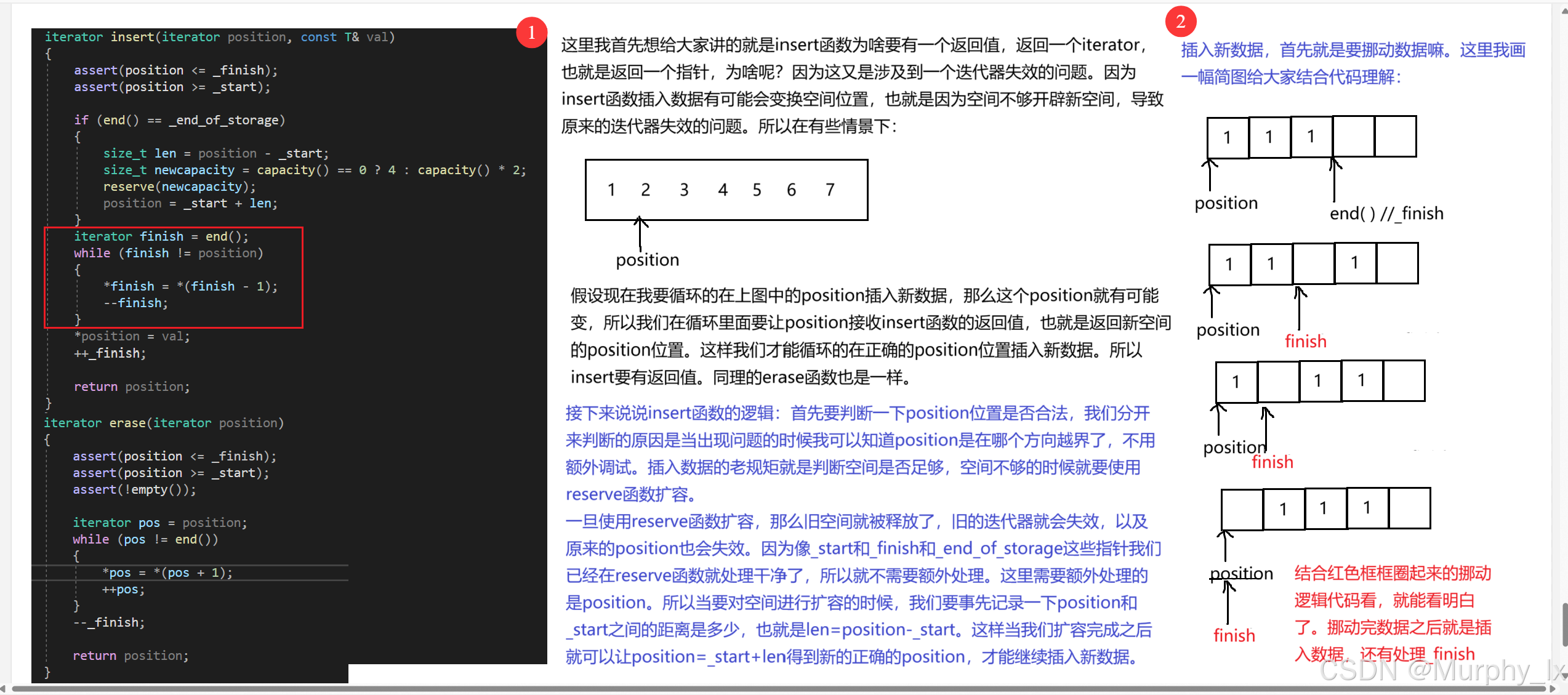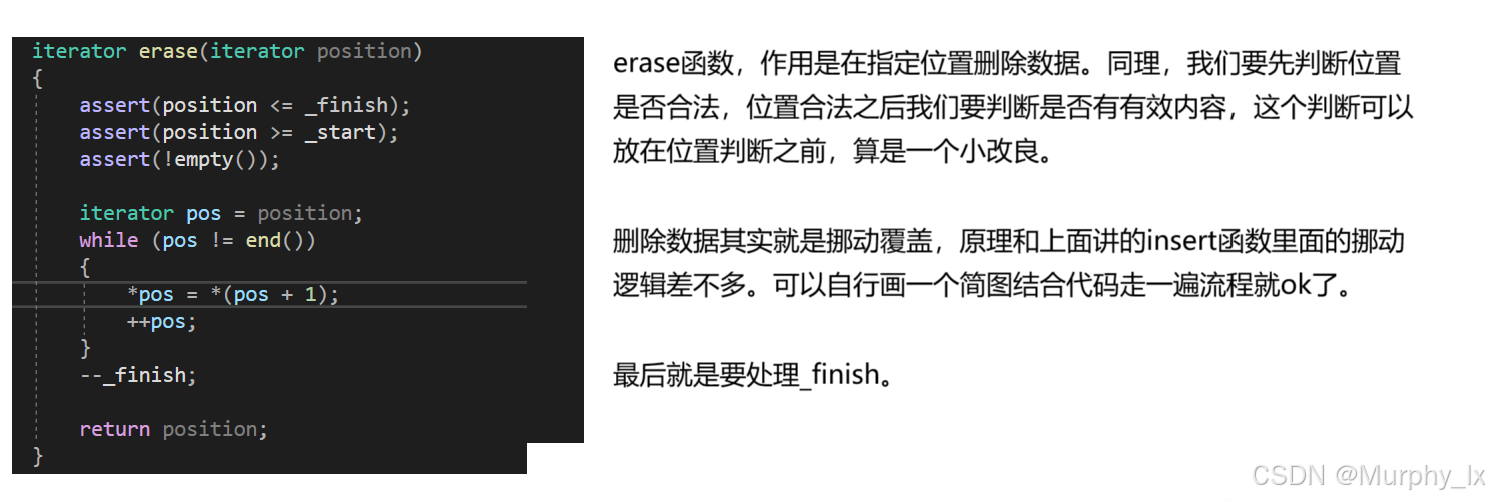C++中的vector(2)
C++中的vector(2)
那么这次我们复现vector之前会选择性的看一些源码,这份源码并不是最新的,不过也够了。这里我直接把源码贴出来给大家,大家可以先行复制一份到本地电脑上看。
源码
这里完整的stl的源码,我会上传到gitee码云,这是网址:Murphy/博客存档,就是里面的那个stl30文件夹,里面就是源码。
将源码存到本地后,跳到观察源码这一节。
vector
/*** Copyright (c) 1994* Hewlett-Packard Company** Permission to use, copy, modify, distribute and sell this software* and its documentation for any purpose is hereby granted without fee,* provided that the above copyright notice appear in all copies and* that both that copyright notice and this permission notice appear* in supporting documentation. Hewlett-Packard Company makes no* representations about the suitability of this software for any* purpose. It is provided "as is" without express or implied warranty.*** Copyright (c) 1996* Silicon Graphics Computer Systems, Inc.** Permission to use, copy, modify, distribute and sell this software* and its documentation for any purpose is hereby granted without fee,* provided that the above copyright notice appear in all copies and* that both that copyright notice and this permission notice appear* in supporting documentation. Silicon Graphics makes no* representations about the suitability of this software for any* purpose. It is provided "as is" without express or implied warranty.*/#ifndef __SGI_STL_VECTOR
#define __SGI_STL_VECTOR#include <stl_algobase.h>
#include <stl_alloc.h>
#include <stl_construct.h>
#include <stl_uninitialized.h>
#include <stl_vector.h>
#include <stl_bvector.h>#endif /* __SGI_STL_VECTOR */// Local Variables:
// mode:C++
// End:stl_vector.h
/*** Copyright (c) 1994* Hewlett-Packard Company** Permission to use, copy, modify, distribute and sell this software* and its documentation for any purpose is hereby granted without fee,* provided that the above copyright notice appear in all copies and* that both that copyright notice and this permission notice appear* in supporting documentation. Hewlett-Packard Company makes no* representations about the suitability of this software for any* purpose. It is provided "as is" without express or implied warranty.*** Copyright (c) 1996* Silicon Graphics Computer Systems, Inc.** Permission to use, copy, modify, distribute and sell this software* and its documentation for any purpose is hereby granted without fee,* provided that the above copyright notice appear in all copies and* that both that copyright notice and this permission notice appear* in supporting documentation. Silicon Graphics makes no* representations about the suitability of this software for any* purpose. It is provided "as is" without express or implied warranty.*//* NOTE: This is an internal header file, included by other STL headers.* You should not attempt to use it directly.*/#ifndef __SGI_STL_INTERNAL_VECTOR_H
#define __SGI_STL_INTERNAL_VECTOR_H__STL_BEGIN_NAMESPACE #if defined(__sgi) && !defined(__GNUC__) && (_MIPS_SIM != _MIPS_SIM_ABI32)
#pragma set woff 1174
#endiftemplate <class T, class Alloc = alloc>
class vector {
public:typedef T value_type;typedef value_type* pointer;typedef const value_type* const_pointer;typedef value_type* iterator;typedef const value_type* const_iterator;typedef value_type& reference;typedef const value_type& const_reference;typedef size_t size_type;typedef ptrdiff_t difference_type;#ifdef __STL_CLASS_PARTIAL_SPECIALIZATIONtypedef reverse_iterator<const_iterator> const_reverse_iterator;typedef reverse_iterator<iterator> reverse_iterator;
#else /* __STL_CLASS_PARTIAL_SPECIALIZATION */typedef reverse_iterator<const_iterator, value_type, const_reference, difference_type> const_reverse_iterator;typedef reverse_iterator<iterator, value_type, reference, difference_type>reverse_iterator;
#endif /* __STL_CLASS_PARTIAL_SPECIALIZATION */
protected:typedef simple_alloc<value_type, Alloc> data_allocator;iterator start;iterator finish;iterator end_of_storage;void insert_aux(iterator position, const T& x);void deallocate() {if (start) data_allocator::deallocate(start, end_of_storage - start);}void fill_initialize(size_type n, const T& value) {start = allocate_and_fill(n, value);finish = start + n;end_of_storage = finish;}
public:iterator begin() { return start; }const_iterator begin() const { return start; }iterator end() { return finish; }const_iterator end() const { return finish; }reverse_iterator rbegin() { return reverse_iterator(end()); }const_reverse_iterator rbegin() const { return const_reverse_iterator(end()); }reverse_iterator rend() { return reverse_iterator(begin()); }const_reverse_iterator rend() const { return const_reverse_iterator(begin()); }size_type size() const { return size_type(end() - begin()); }size_type max_size() const { return size_type(-1) / sizeof(T); }size_type capacity() const { return size_type(end_of_storage - begin()); }bool empty() const { return begin() == end(); }reference operator[](size_type n) { return *(begin() + n); }const_reference operator[](size_type n) const { return *(begin() + n); }vector() : start(0), finish(0), end_of_storage(0) {}vector(size_type n, const T& value) { fill_initialize(n, value); }vector(int n, const T& value) { fill_initialize(n, value); }vector(long n, const T& value) { fill_initialize(n, value); }explicit vector(size_type n) { fill_initialize(n, T()); }vector(const vector<T, Alloc>& x) {start = allocate_and_copy(x.end() - x.begin(), x.begin(), x.end());finish = start + (x.end() - x.begin());end_of_storage = finish;}
#ifdef __STL_MEMBER_TEMPLATEStemplate <class InputIterator>vector(InputIterator first, InputIterator last) :start(0), finish(0), end_of_storage(0){range_initialize(first, last, iterator_category(first));}
#else /* __STL_MEMBER_TEMPLATES */vector(const_iterator first, const_iterator last) {size_type n = 0;distance(first, last, n);start = allocate_and_copy(n, first, last);finish = start + n;end_of_storage = finish;}
#endif /* __STL_MEMBER_TEMPLATES */~vector() { destroy(start, finish);deallocate();}vector<T, Alloc>& operator=(const vector<T, Alloc>& x);void reserve(size_type n) {if (capacity() < n) {const size_type old_size = size();iterator tmp = allocate_and_copy(n, start, finish);destroy(start, finish);deallocate();start = tmp;finish = tmp + old_size;end_of_storage = start + n;}}reference front() { return *begin(); }const_reference front() const { return *begin(); }reference back() { return *(end() - 1); }const_reference back() const { return *(end() - 1); }void push_back(const T& x) {if (finish != end_of_storage) {construct(finish, x);++finish;}elseinsert_aux(end(), x);}void swap(vector<T, Alloc>& x) {__STD::swap(start, x.start);__STD::swap(finish, x.finish);__STD::swap(end_of_storage, x.end_of_storage);}iterator insert(iterator position, const T& x) {size_type n = position - begin();if (finish != end_of_storage && position == end()) {construct(finish, x);++finish;}elseinsert_aux(position, x);return begin() + n;}iterator insert(iterator position) { return insert(position, T()); }
#ifdef __STL_MEMBER_TEMPLATEStemplate <class InputIterator>void insert(iterator position, InputIterator first, InputIterator last) {range_insert(position, first, last, iterator_category(first));}
#else /* __STL_MEMBER_TEMPLATES */void insert(iterator position,const_iterator first, const_iterator last);
#endif /* __STL_MEMBER_TEMPLATES */void insert (iterator pos, size_type n, const T& x);void insert (iterator pos, int n, const T& x) {insert(pos, (size_type) n, x);}void insert (iterator pos, long n, const T& x) {insert(pos, (size_type) n, x);}void pop_back() {--finish;destroy(finish);}iterator erase(iterator position) {if (position + 1 != end())copy(position + 1, finish, position);--finish;destroy(finish);return position;}iterator erase(iterator first, iterator last) {iterator i = copy(last, finish, first);destroy(i, finish);finish = finish - (last - first);return first;}void resize(size_type new_size, const T& x) {if (new_size < size()) erase(begin() + new_size, end());elseinsert(end(), new_size - size(), x);}void resize(size_type new_size) { resize(new_size, T()); }void clear() { erase(begin(), end()); }protected:iterator allocate_and_fill(size_type n, const T& x) {iterator result = data_allocator::allocate(n);__STL_TRY {uninitialized_fill_n(result, n, x);return result;}__STL_UNWIND(data_allocator::deallocate(result, n));}#ifdef __STL_MEMBER_TEMPLATEStemplate <class ForwardIterator>iterator allocate_and_copy(size_type n,ForwardIterator first, ForwardIterator last) {iterator result = data_allocator::allocate(n);__STL_TRY {uninitialized_copy(first, last, result);return result;}__STL_UNWIND(data_allocator::deallocate(result, n));}
#else /* __STL_MEMBER_TEMPLATES */iterator allocate_and_copy(size_type n,const_iterator first, const_iterator last) {iterator result = data_allocator::allocate(n);__STL_TRY {uninitialized_copy(first, last, result);return result;}__STL_UNWIND(data_allocator::deallocate(result, n));}
#endif /* __STL_MEMBER_TEMPLATES */#ifdef __STL_MEMBER_TEMPLATEStemplate <class InputIterator>void range_initialize(InputIterator first, InputIterator last,input_iterator_tag) {for ( ; first != last; ++first)push_back(*first);}// This function is only called by the constructor. We have to worry// about resource leaks, but not about maintaining invariants.template <class ForwardIterator>void range_initialize(ForwardIterator first, ForwardIterator last,forward_iterator_tag) {size_type n = 0;distance(first, last, n);start = allocate_and_copy(n, first, last);finish = start + n;end_of_storage = finish;}template <class InputIterator>void range_insert(iterator pos,InputIterator first, InputIterator last,input_iterator_tag);template <class ForwardIterator>void range_insert(iterator pos,ForwardIterator first, ForwardIterator last,forward_iterator_tag);#endif /* __STL_MEMBER_TEMPLATES */
};template <class T, class Alloc>
inline bool operator==(const vector<T, Alloc>& x, const vector<T, Alloc>& y) {return x.size() == y.size() && equal(x.begin(), x.end(), y.begin());
}template <class T, class Alloc>
inline bool operator<(const vector<T, Alloc>& x, const vector<T, Alloc>& y) {return lexicographical_compare(x.begin(), x.end(), y.begin(), y.end());
}#ifdef __STL_FUNCTION_TMPL_PARTIAL_ORDERtemplate <class T, class Alloc>
inline void swap(vector<T, Alloc>& x, vector<T, Alloc>& y) {x.swap(y);
}#endif /* __STL_FUNCTION_TMPL_PARTIAL_ORDER */template <class T, class Alloc>
vector<T, Alloc>& vector<T, Alloc>::operator=(const vector<T, Alloc>& x) {if (&x != this) {if (x.size() > capacity()) {iterator tmp = allocate_and_copy(x.end() - x.begin(),x.begin(), x.end());destroy(start, finish);deallocate();start = tmp;end_of_storage = start + (x.end() - x.begin());}else if (size() >= x.size()) {iterator i = copy(x.begin(), x.end(), begin());destroy(i, finish);}else {copy(x.begin(), x.begin() + size(), start);uninitialized_copy(x.begin() + size(), x.end(), finish);}finish = start + x.size();}return *this;
}template <class T, class Alloc>
void vector<T, Alloc>::insert_aux(iterator position, const T& x) {if (finish != end_of_storage) {construct(finish, *(finish - 1));++finish;T x_copy = x;copy_backward(position, finish - 2, finish - 1);*position = x_copy;}else {const size_type old_size = size();const size_type len = old_size != 0 ? 2 * old_size : 1;iterator new_start = data_allocator::allocate(len);iterator new_finish = new_start;__STL_TRY {new_finish = uninitialized_copy(start, position, new_start);construct(new_finish, x);++new_finish;new_finish = uninitialized_copy(position, finish, new_finish);}# ifdef __STL_USE_EXCEPTIONS catch(...) {destroy(new_start, new_finish); data_allocator::deallocate(new_start, len);throw;}
# endif /* __STL_USE_EXCEPTIONS */destroy(begin(), end());deallocate();start = new_start;finish = new_finish;end_of_storage = new_start + len;}
}template <class T, class Alloc>
void vector<T, Alloc>::insert(iterator position, size_type n, const T& x) {if (n != 0) {if (size_type(end_of_storage - finish) >= n) {T x_copy = x;const size_type elems_after = finish - position;iterator old_finish = finish;if (elems_after > n) {uninitialized_copy(finish - n, finish, finish);finish += n;copy_backward(position, old_finish - n, old_finish);fill(position, position + n, x_copy);}else {uninitialized_fill_n(finish, n - elems_after, x_copy);finish += n - elems_after;uninitialized_copy(position, old_finish, finish);finish += elems_after;fill(position, old_finish, x_copy);}}else {const size_type old_size = size(); const size_type len = old_size + max(old_size, n);iterator new_start = data_allocator::allocate(len);iterator new_finish = new_start;__STL_TRY {new_finish = uninitialized_copy(start, position, new_start);new_finish = uninitialized_fill_n(new_finish, n, x);new_finish = uninitialized_copy(position, finish, new_finish);}
# ifdef __STL_USE_EXCEPTIONS catch(...) {destroy(new_start, new_finish);data_allocator::deallocate(new_start, len);throw;}
# endif /* __STL_USE_EXCEPTIONS */destroy(start, finish);deallocate();start = new_start;finish = new_finish;end_of_storage = new_start + len;}}
}#ifdef __STL_MEMBER_TEMPLATEStemplate <class T, class Alloc> template <class InputIterator>
void vector<T, Alloc>::range_insert(iterator pos,InputIterator first, InputIterator last,input_iterator_tag) {for ( ; first != last; ++first) {pos = insert(pos, *first);++pos;}
}template <class T, class Alloc> template <class ForwardIterator>
void vector<T, Alloc>::range_insert(iterator position,ForwardIterator first,ForwardIterator last,forward_iterator_tag) {if (first != last) {size_type n = 0;distance(first, last, n);if (size_type(end_of_storage - finish) >= n) {const size_type elems_after = finish - position;iterator old_finish = finish;if (elems_after > n) {uninitialized_copy(finish - n, finish, finish);finish += n;copy_backward(position, old_finish - n, old_finish);copy(first, last, position);}else {ForwardIterator mid = first;advance(mid, elems_after);uninitialized_copy(mid, last, finish);finish += n - elems_after;uninitialized_copy(position, old_finish, finish);finish += elems_after;copy(first, mid, position);}}else {const size_type old_size = size();const size_type len = old_size + max(old_size, n);iterator new_start = data_allocator::allocate(len);iterator new_finish = new_start;__STL_TRY {new_finish = uninitialized_copy(start, position, new_start);new_finish = uninitialized_copy(first, last, new_finish);new_finish = uninitialized_copy(position, finish, new_finish);}
# ifdef __STL_USE_EXCEPTIONScatch(...) {destroy(new_start, new_finish);data_allocator::deallocate(new_start, len);throw;}
# endif /* __STL_USE_EXCEPTIONS */destroy(start, finish);deallocate();start = new_start;finish = new_finish;end_of_storage = new_start + len;}}
}#else /* __STL_MEMBER_TEMPLATES */template <class T, class Alloc>
void vector<T, Alloc>::insert(iterator position, const_iterator first, const_iterator last) {if (first != last) {size_type n = 0;distance(first, last, n);if (size_type(end_of_storage - finish) >= n) {const size_type elems_after = finish - position;iterator old_finish = finish;if (elems_after > n) {uninitialized_copy(finish - n, finish, finish);finish += n;copy_backward(position, old_finish - n, old_finish);copy(first, last, position);}else {uninitialized_copy(first + elems_after, last, finish);finish += n - elems_after;uninitialized_copy(position, old_finish, finish);finish += elems_after;copy(first, first + elems_after, position);}}else {const size_type old_size = size();const size_type len = old_size + max(old_size, n);iterator new_start = data_allocator::allocate(len);iterator new_finish = new_start;__STL_TRY {new_finish = uninitialized_copy(start, position, new_start);new_finish = uninitialized_copy(first, last, new_finish);new_finish = uninitialized_copy(position, finish, new_finish);}
# ifdef __STL_USE_EXCEPTIONScatch(...) {destroy(new_start, new_finish);data_allocator::deallocate(new_start, len);throw;}
# endif /* __STL_USE_EXCEPTIONS */destroy(start, finish);deallocate();start = new_start;finish = new_finish;end_of_storage = new_start + len;}}
}#endif /* __STL_MEMBER_TEMPLATES */#if defined(__sgi) && !defined(__GNUC__) && (_MIPS_SIM != _MIPS_SIM_ABI32)
#pragma reset woff 1174
#endif__STL_END_NAMESPACE #endif /* __SGI_STL_INTERNAL_VECTOR_H */// Local Variables:
// mode:C++
// End:观察源码
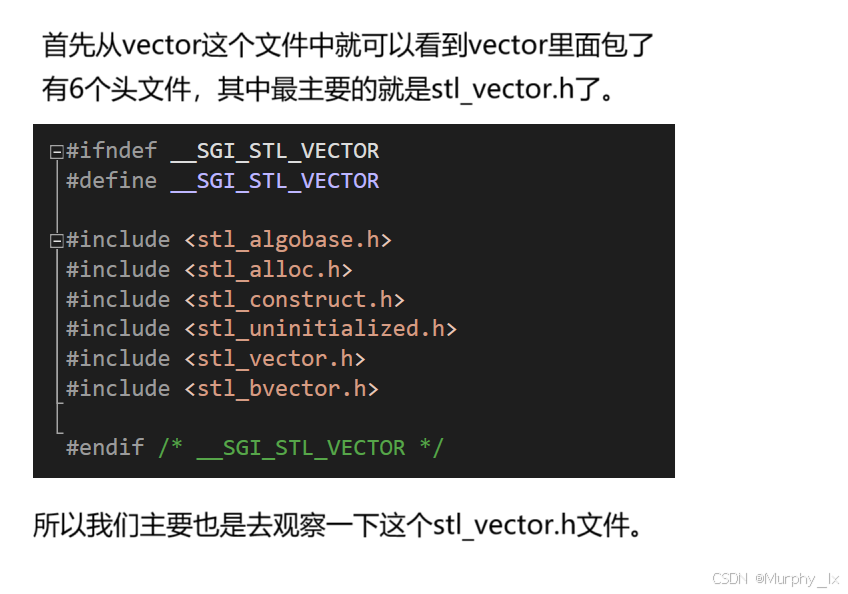
在看stl_vector.h文件之前,我得先和大家说一些东西:就是我们看源码,特别是以我们初学者的水平,不要过于细致的去看源码,抠细节,不要拿到源码就一行一行的看。
第一:源码的设计者的水平比我们高了不止6,7层楼,而且他们设计出来的东西是给全世界的程序员用的,所以源码的设计会十分的严谨。你细看下去,容易在第一行就看不懂了,就陷入进去了,走火入魔,怀疑人生了。
第二:以我们目前的阶段,并不需要像源码的设计者一样,设计一个完全一模一样,与之媲美的源码,也不需要特别的严谨,我们只需要大概了解这个东西的主要框架,主要的设计思想,并仿照设计者的思想,写一个差不多的代码出来就ok了。
那么我刚刚也说了,现阶段看源码主要是看框架和思想,那怎么看框架和思想呢?怎么能快速的了解到类的主要内容呢?那我们可以从下面几点入手:
- 看成员变量
- 看构造函数(怎么初始化的)
- 看插入逻辑
- 结合翻译,连蒙带猜(函数/变量名字都是对应着功能的)
那么我们就开始看stl_vector.h文件吧。
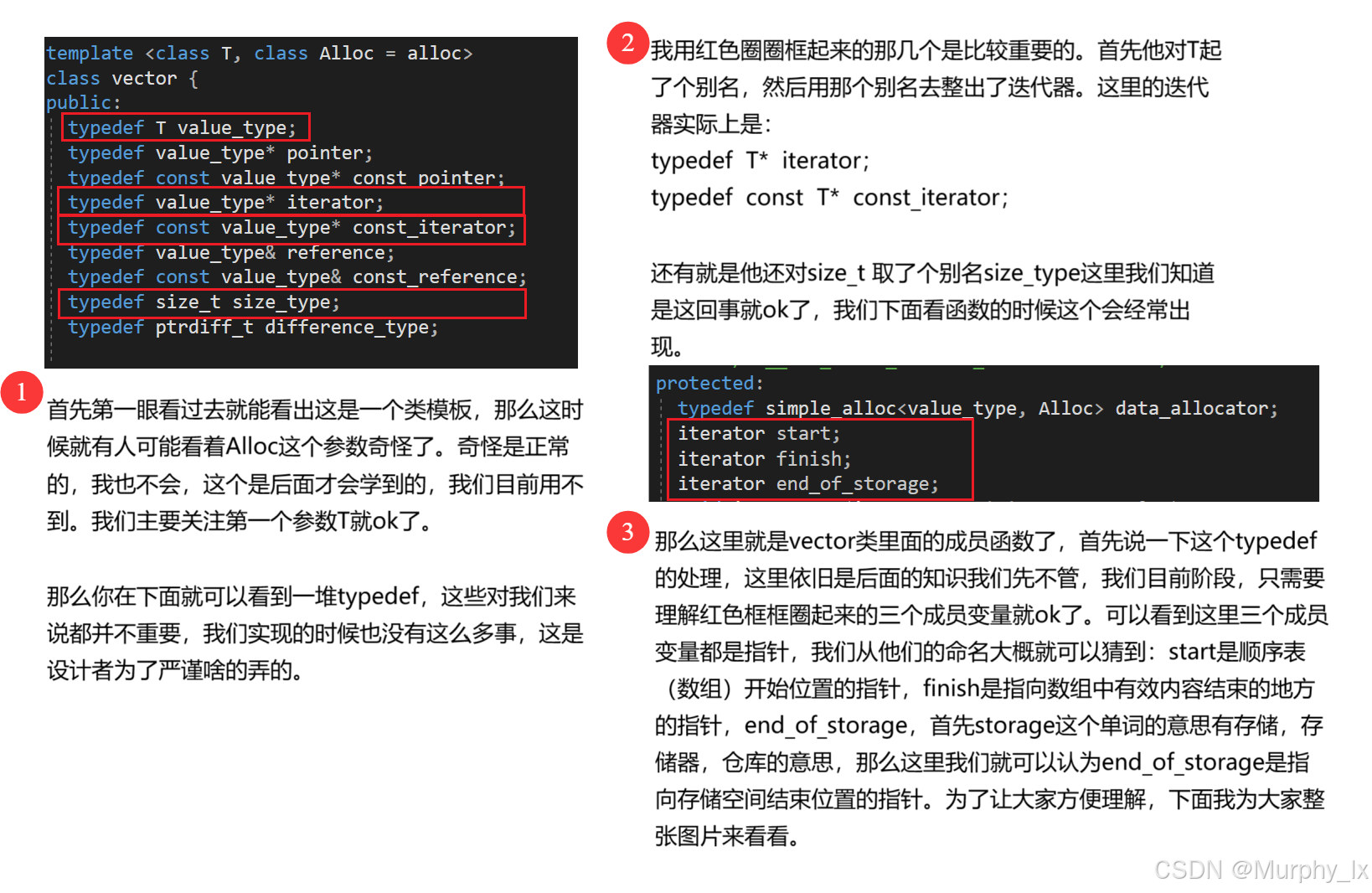
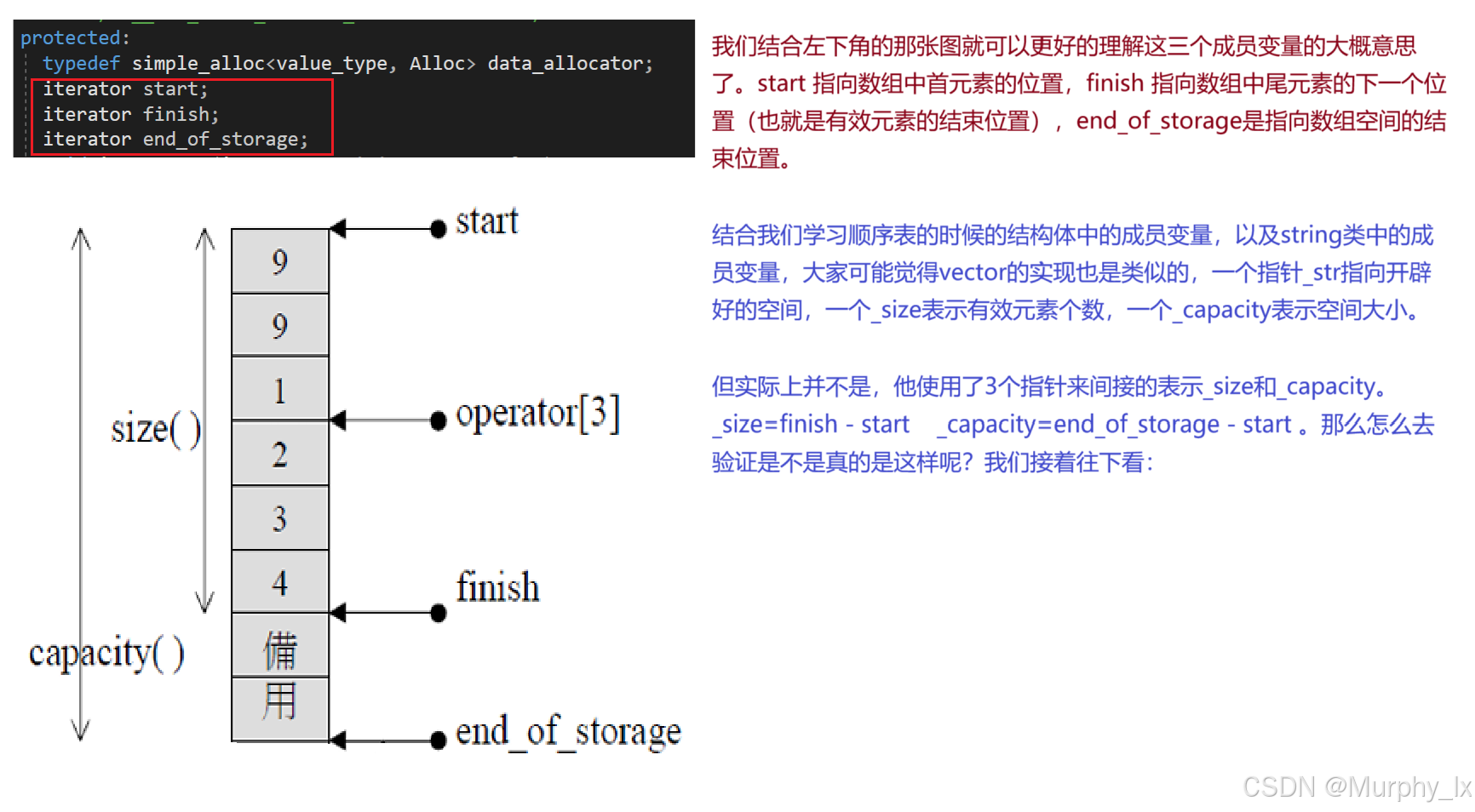
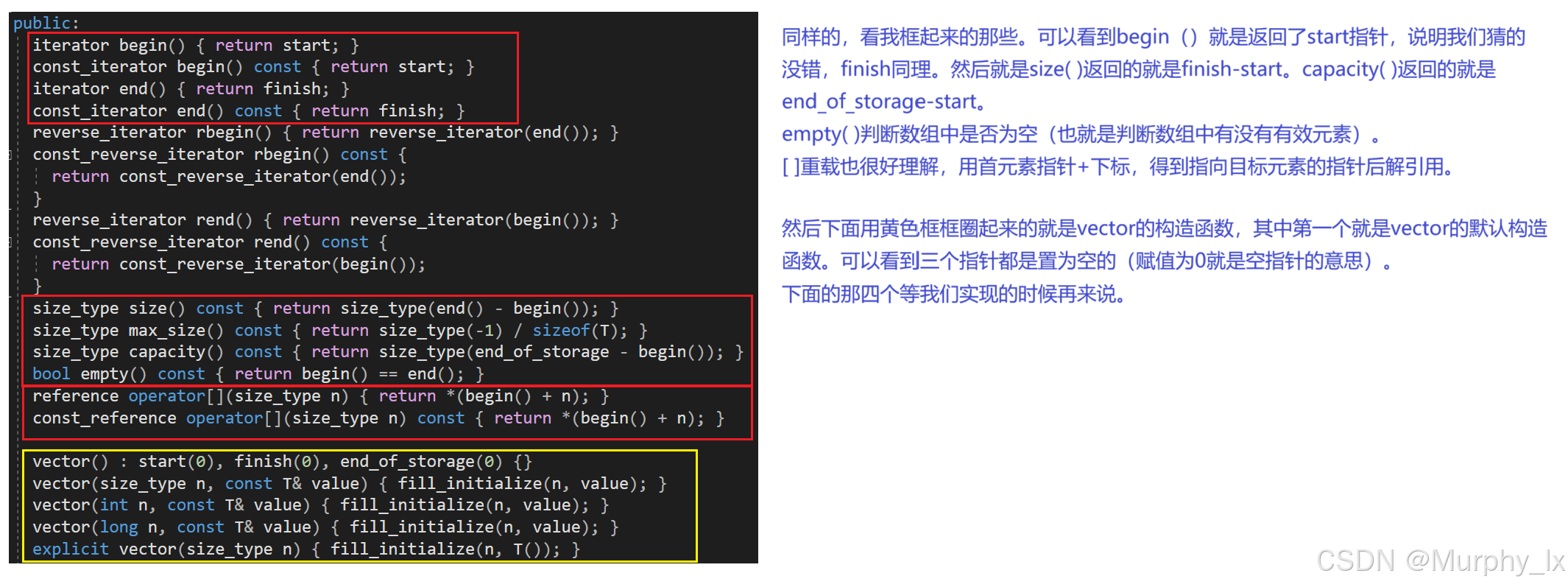
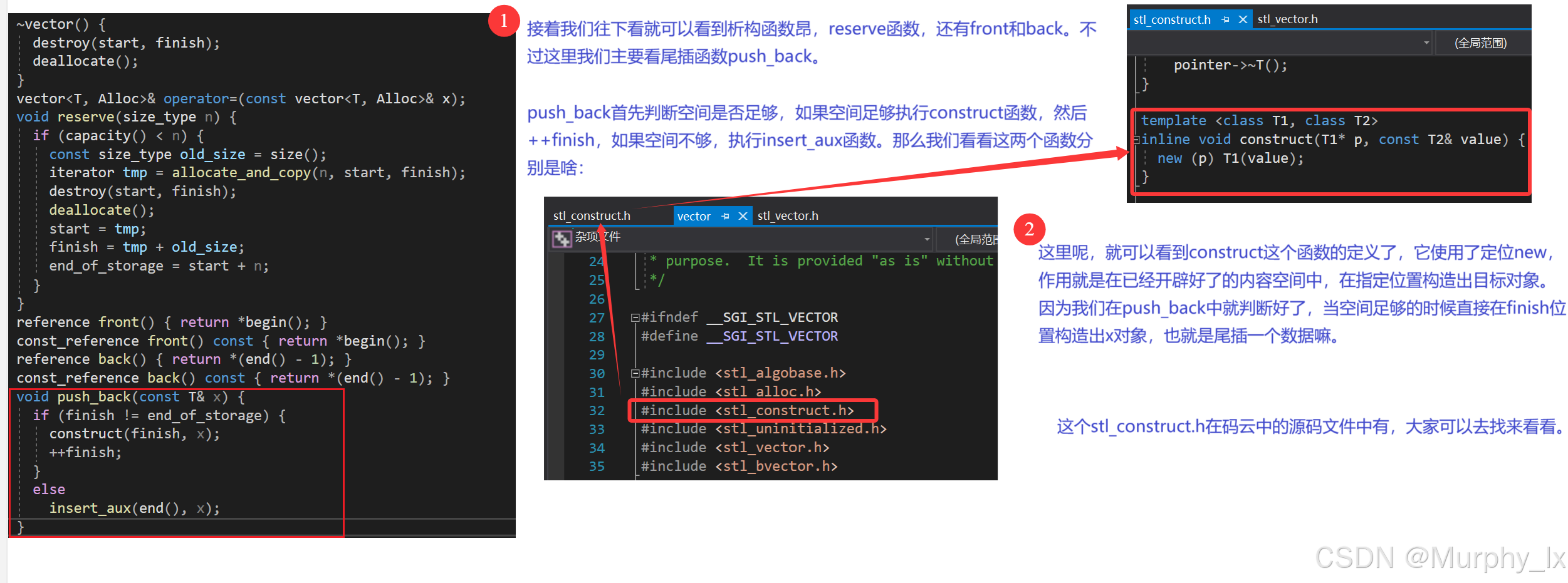
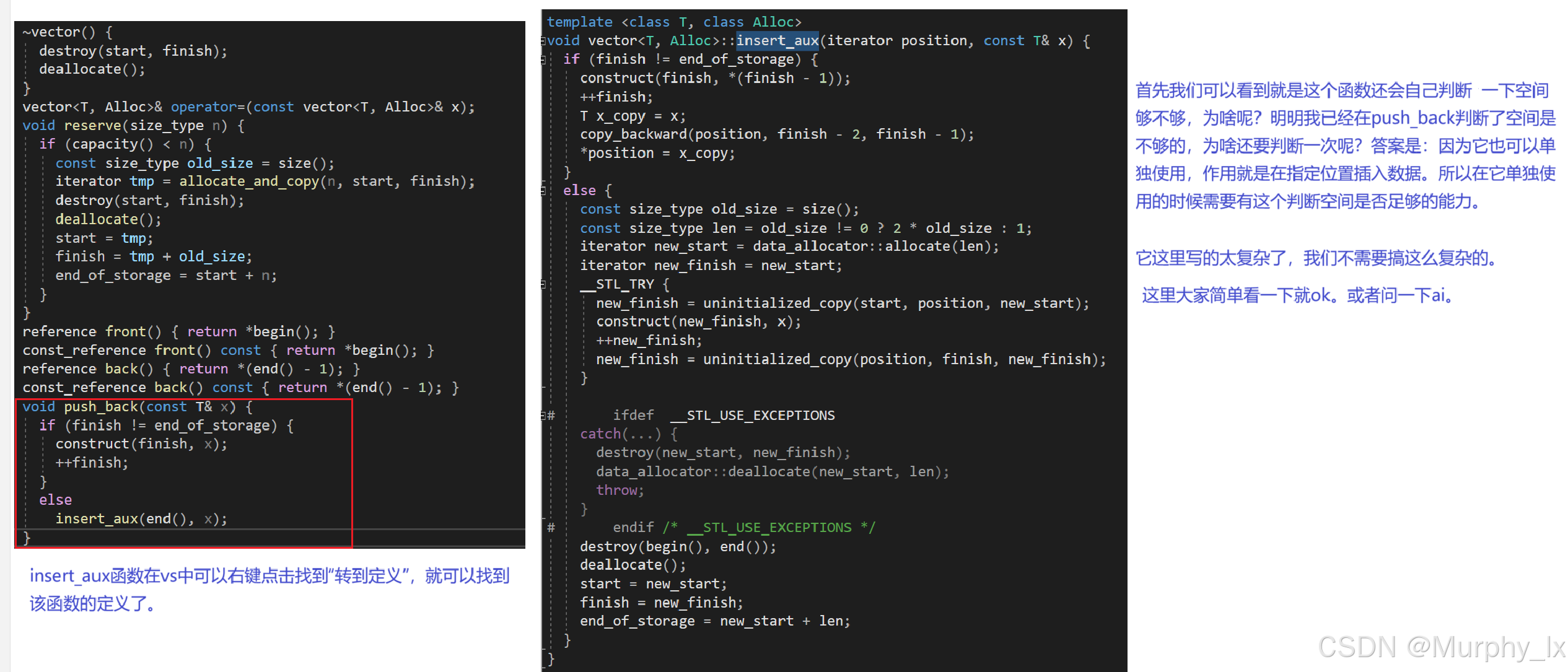
那么到这里,我们其实就差不多了解库里面vector的大概框架是什么样的了,那么接下来就到我们去动手模拟一个vector出来了。
模拟实现
这里先贴出代码给大家:
代码
vector.h
#pragma once
#include<cassert> namespace lx
{template<class T>class vector{public:typedef T* iterator;typedef const T* const_iterator;/*vector():_start(nullptr), _finish(nullptr), _end_of_storage(nullptr){}*///因为我们在成员变量那里给了缺省值,这个缺省值就是给初始化列表使用的//所以我们就可以写成下面那样,简洁些。当然,你也可以写成上面那样。vector() {}//默认构造~vector(){if (_start){delete[] _start;_start = nullptr;_finish = nullptr;_end_of_storage = nullptr;}}/*vector(const vector& x)//拷贝构造传统写法{size_t x_size = x.size();size_t x_capacity = x.capacity();_start = new T[x_capacity];_finish = _start + x_size;_end_of_storage = _start + x_capacity;for (size_t i = 0; i < x_size; i++){_start[i] = x[i];}}*/vector(const vector& x)//拷贝构造现代写法{reserve(x.capacity());/*for (size_t i = 0; i < x.size(); i++){push_back(x[i]);}*/for (const auto& e : x){push_back(e);}}template <class InputIterator>vector(InputIterator first, InputIterator last){while (first != last){push_back(*first);++first;}}vector(size_t n, const T& val = T()){resize(n, val);}vector(int n, const T& val = T()){resize(n, val);}vector<T>& operator=(const vector<T>& x)//赋值重载传统写法{size_t x_size = x.size();size_t x_capacity = x.capacity();delete[] _start;_start = new T[x_capacity];_finish = _start + x_size;_end_of_storage = _start + x_capacity;for (size_t i = 0; i < x_size; i++){_start[i] = x[i];}return *this;}//vector<T>& operator=(vector<T> x)//赋值重载现代写法//{// swap(x);// return *this;//}//Iterators:iterator begin(){return _start;}const_iterator begin() const{return _start;}iterator end(){return _finish;}const_iterator end() const{return _finish;}//Capacity:size_t size() const{return size_t(end() - begin());}size_t capacity() const{return size_t(_end_of_storage - begin());}bool empty() const{return begin() == end();}void reserve(size_t n){if (n > capacity()){size_t old_size = size();T* tmp = new T[n];for (size_t i = 0; i < old_size; i++){tmp[i] = _start[i];}delete[] _start;_start = tmp;_finish = _start + old_size;_end_of_storage = _start + n;}}void resize(size_t n, T val = T()){size_t old_size = size();if (n > old_size){ reserve(n);for (size_t i = old_size; i < n; i++){_start[i] = val;++_finish;}}else{//_finish = _finish - (old_size - n);_finish = _start + n;}}/*void resize(size_t n, T val = T()){if (n > size()){reserve(n);while (_finish < _start + n){*_finish = val;++_finish;}}else{_finish = _start + n;}}*///Element access://元素访问T& front(){return *begin();}const T& front() const{return *begin();}T& back(){return *(end() - 1);}const T& back() const{return *(end() - 1);}T& operator[](size_t n){return *(begin() + n);}const T& operator[](size_t n) const{return *(begin() + n);}//Modifiers:void push_back(const T& val){if (end() == _end_of_storage){size_t newcapacity = capacity() == 0 ? 4 : capacity() * 2;reserve(newcapacity);}//_start[size()] = val;*_finish = val;++_finish;}void pop_back(){assert(!empty());--_finish;}iterator insert(iterator position, const T& val){assert(position <= _finish);assert(position >= _start);if (end() == _end_of_storage){size_t len = position - _start;size_t newcapacity = capacity() == 0 ? 4 : capacity() * 2;reserve(newcapacity);position = _start + len;}iterator finish = end();while (finish != position){*finish = *(finish - 1);--finish;}*position = val;++_finish;return position;}iterator erase(iterator position){assert(position <= _finish);assert(position >= _start);assert(!empty());iterator pos = position;while (pos != end()){*pos = *(pos + 1);++pos;}--_finish;return position;}void swap(vector<T>& x){std::swap(_start, x._start);std::swap(_finish, x._finish);std::swap(_end_of_storage, x._end_of_storage);}private:iterator _start = nullptr;iterator _finish = nullptr;iterator _end_of_storage = nullptr;};}
test.cpp//测试代码
#include<iostream>
#include<string>
using namespace std;#include"vector.h"namespace lx
{void test1(){vector<string> v1;v1.push_back("aaa");v1.push_back("aaa");v1.push_back("aaa");v1.push_back("aaa");v1.push_back("aaa");for (const auto& e : v1){cout << e << " ";}cout << endl;vector<string> v2(v1);for (const auto& e : v2){cout << e << " ";}cout << endl;vector<string> v3;v3 = v1;for (const auto& e : v3){cout << e << " ";}cout << endl;v3.resize(8,"bbb");for (const auto& e : v3){cout << e << " ";}cout << endl;v3.pop_back();for (const auto& e : v3){cout << e << " ";}cout << endl;v3.insert(v3.begin(), "ccc");v3.insert(v3.begin(), "ccc");v3.insert(v3.begin(), "ccc");for (const auto& e : v3){cout << e << " ";}cout << endl;v3.erase(v3.end() - 1);for (const auto& e : v3){cout << e << " ";}cout << endl;}
}
int main()
{lx::test1();return 0;
}
代码讲解
成员变量
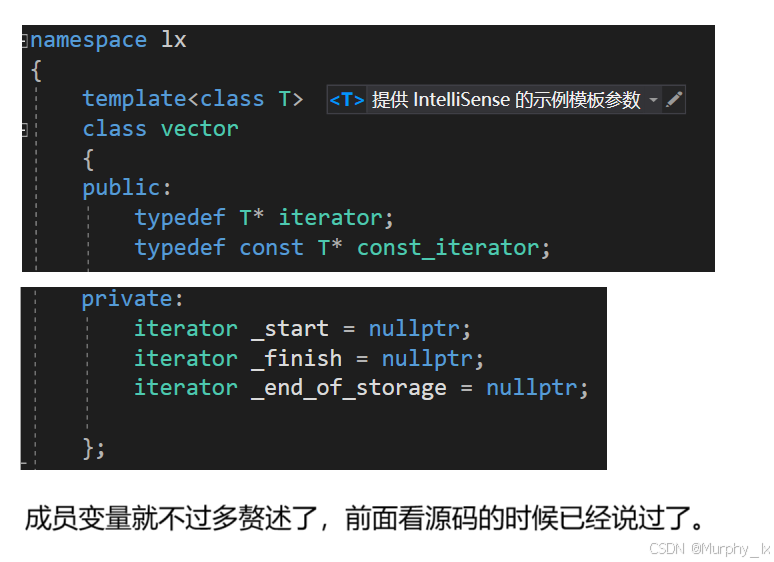
构造函数/析构函数
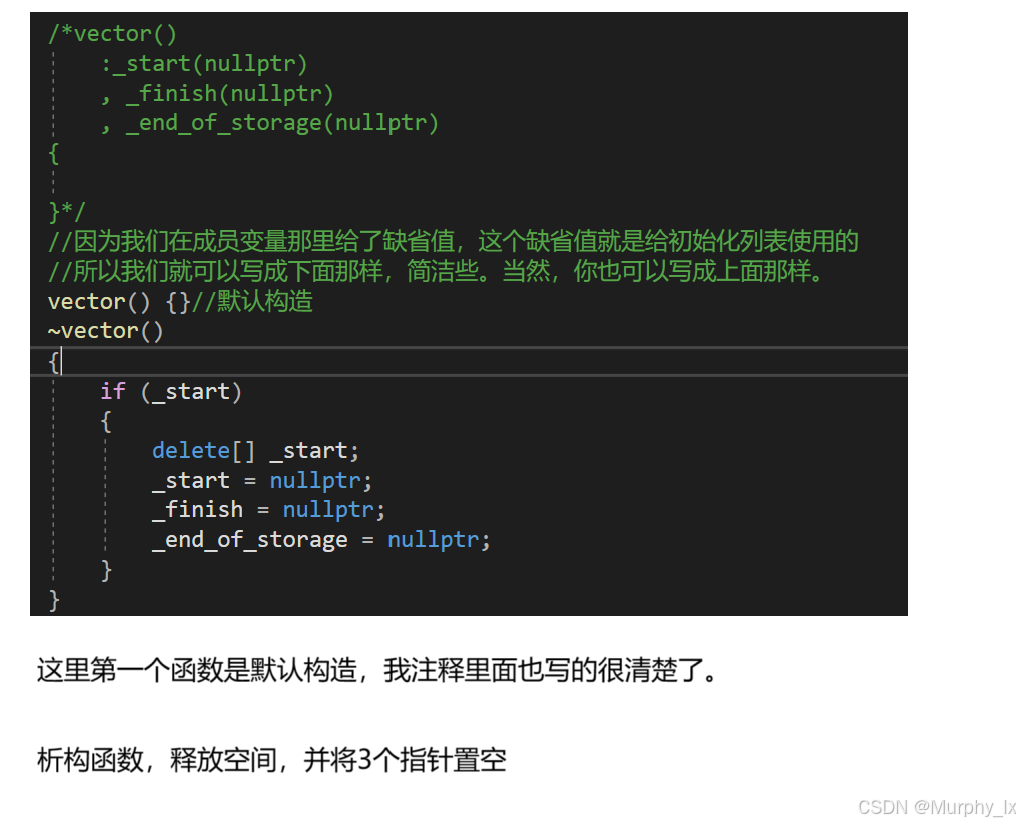
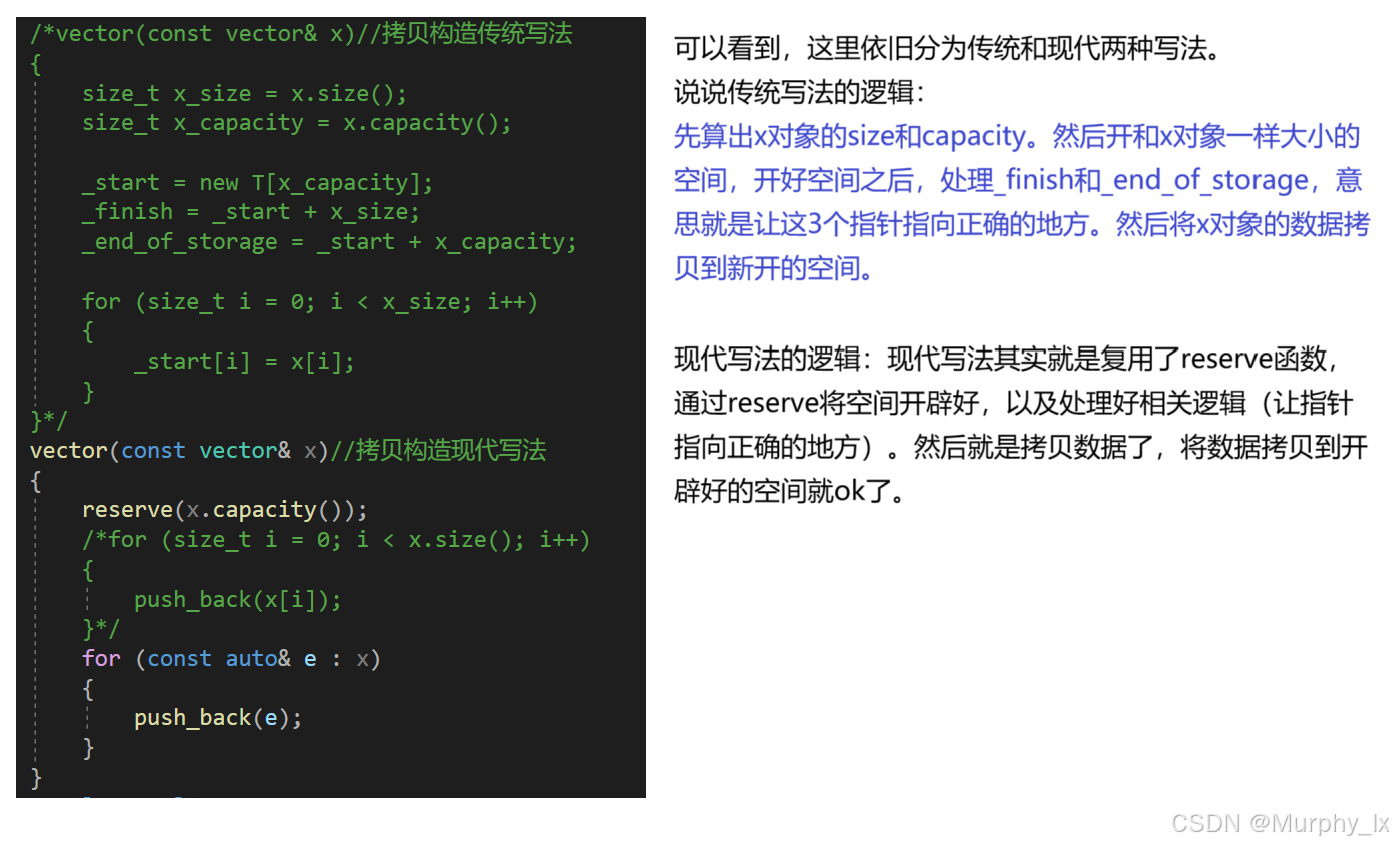
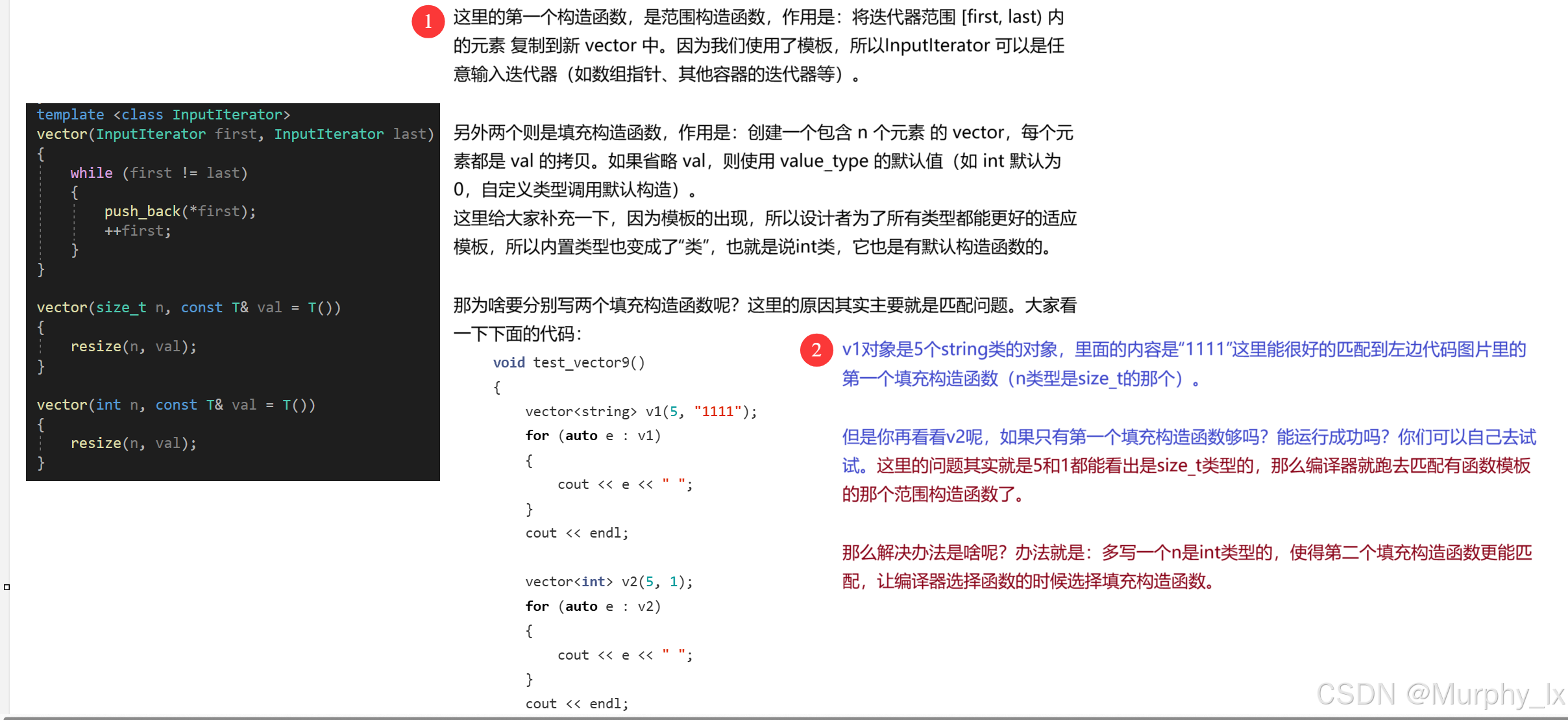
赋值重载
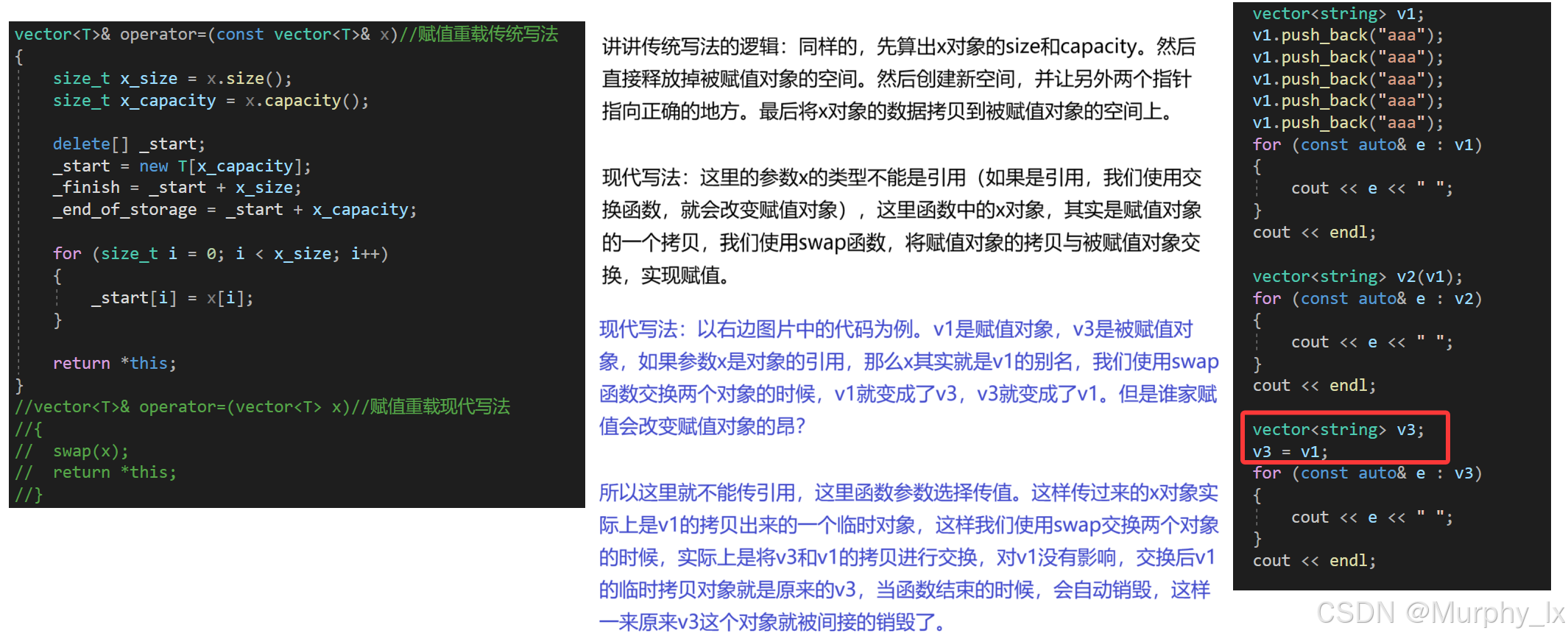
迭代器函数
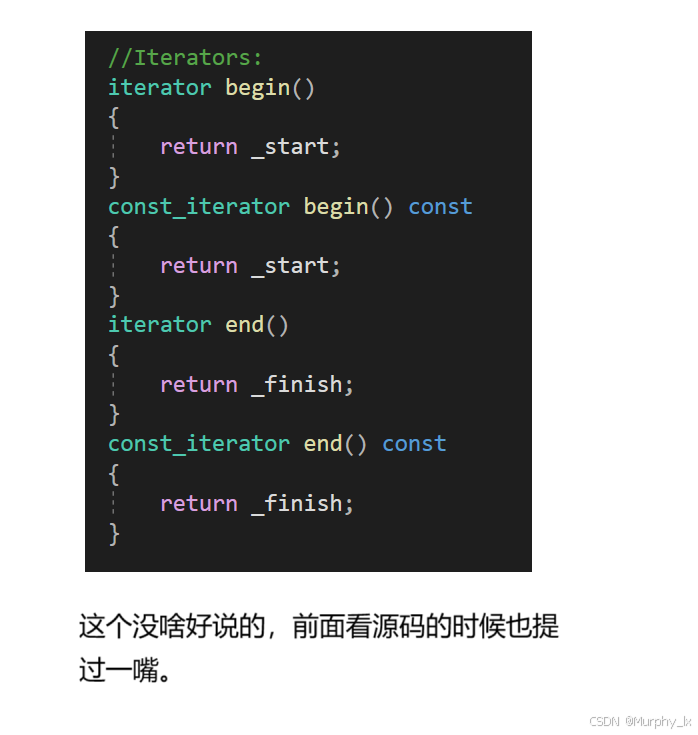
容量函数
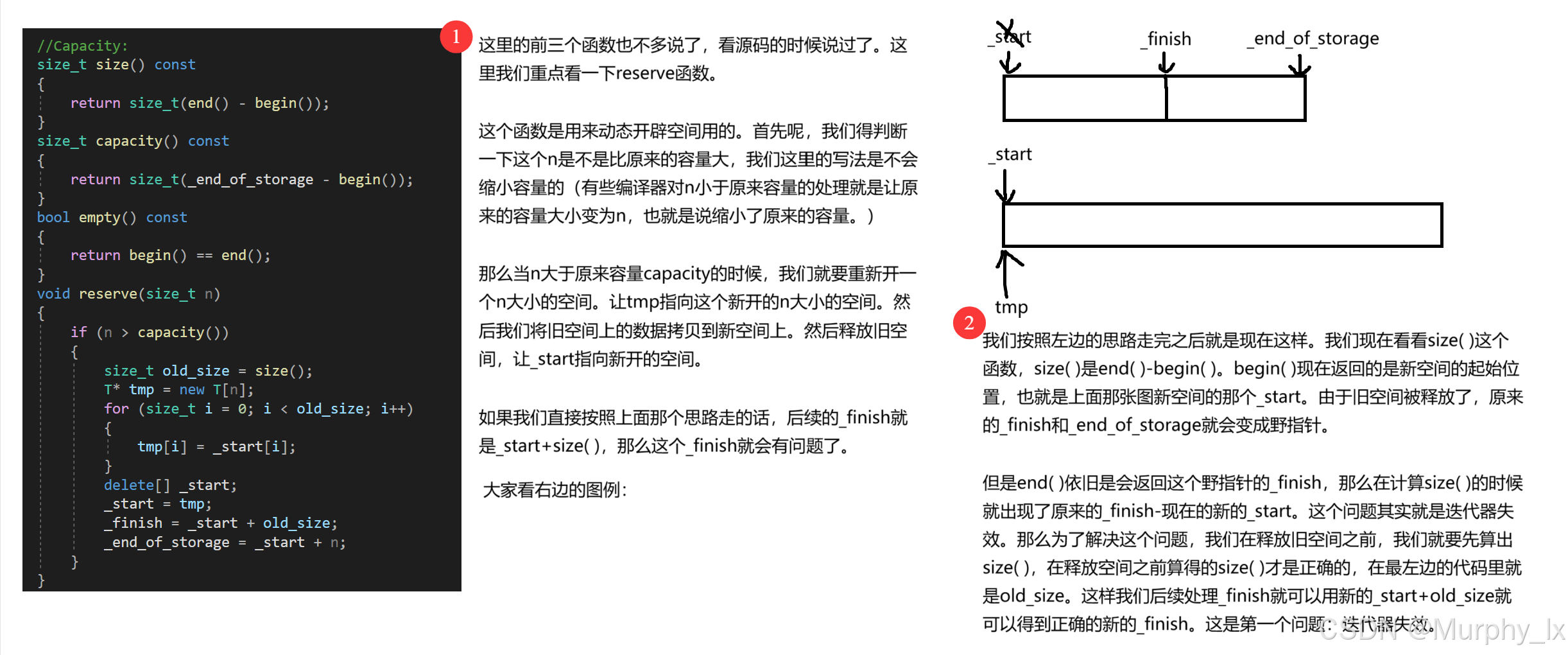
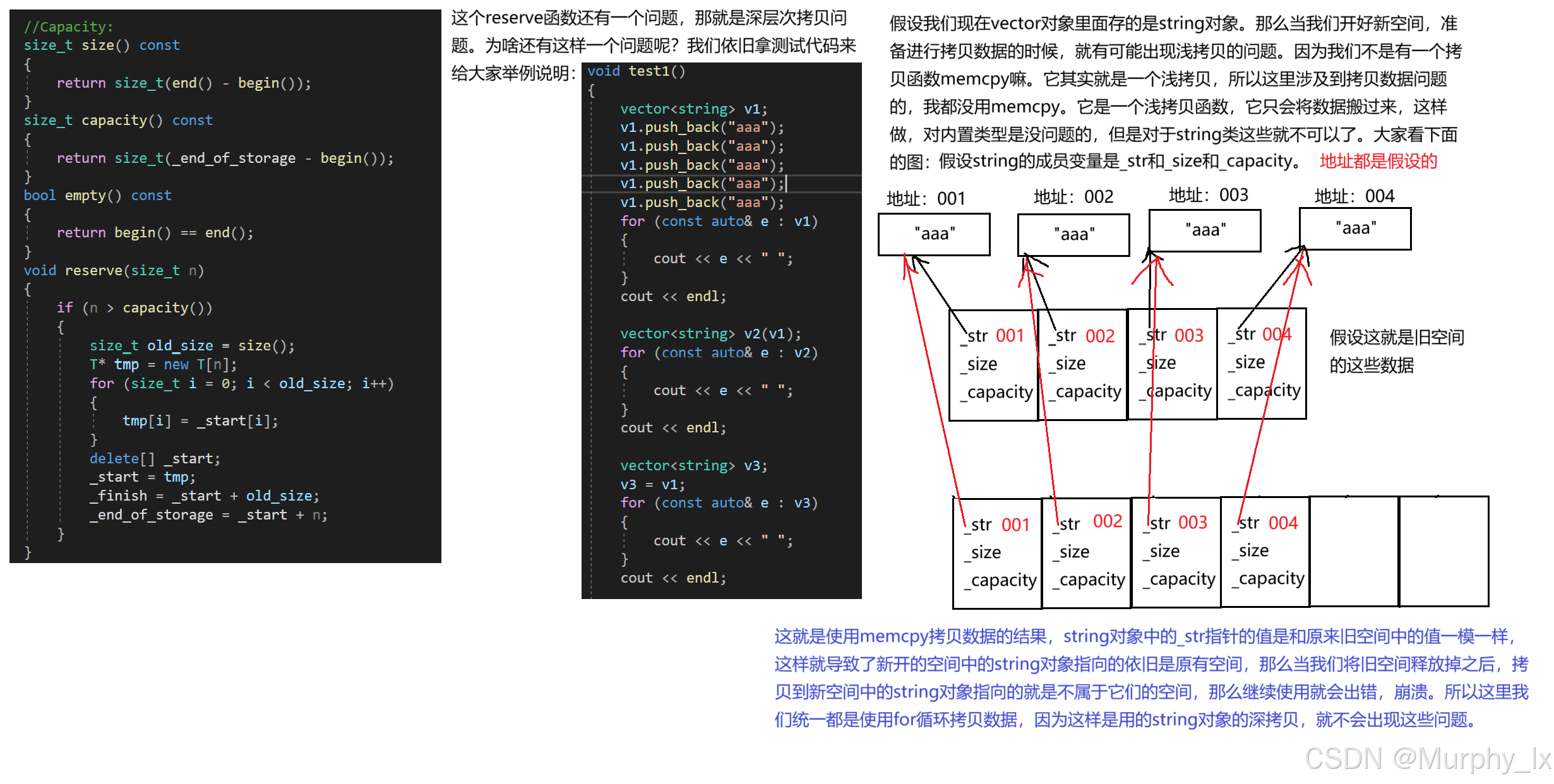
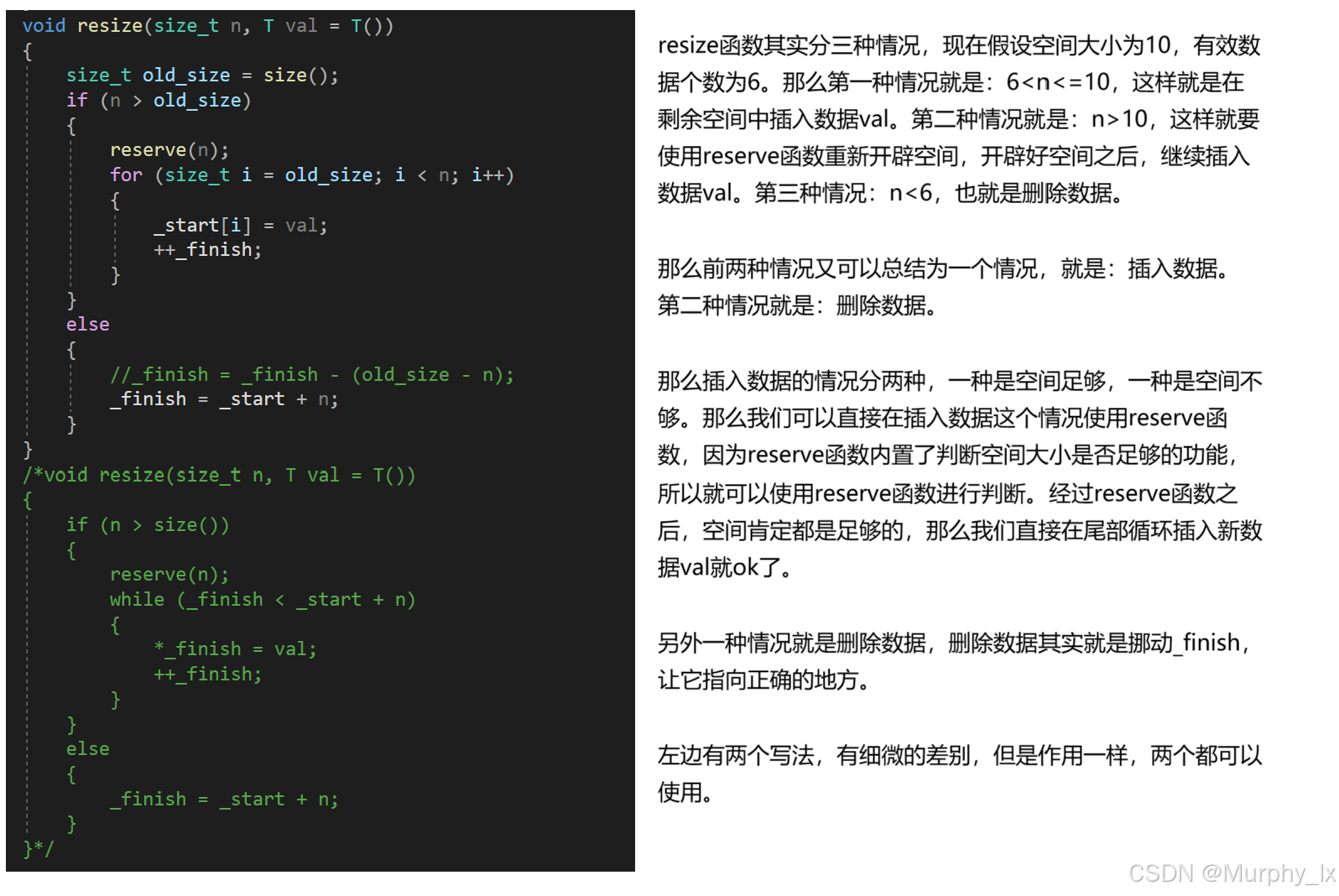
元素访问函数
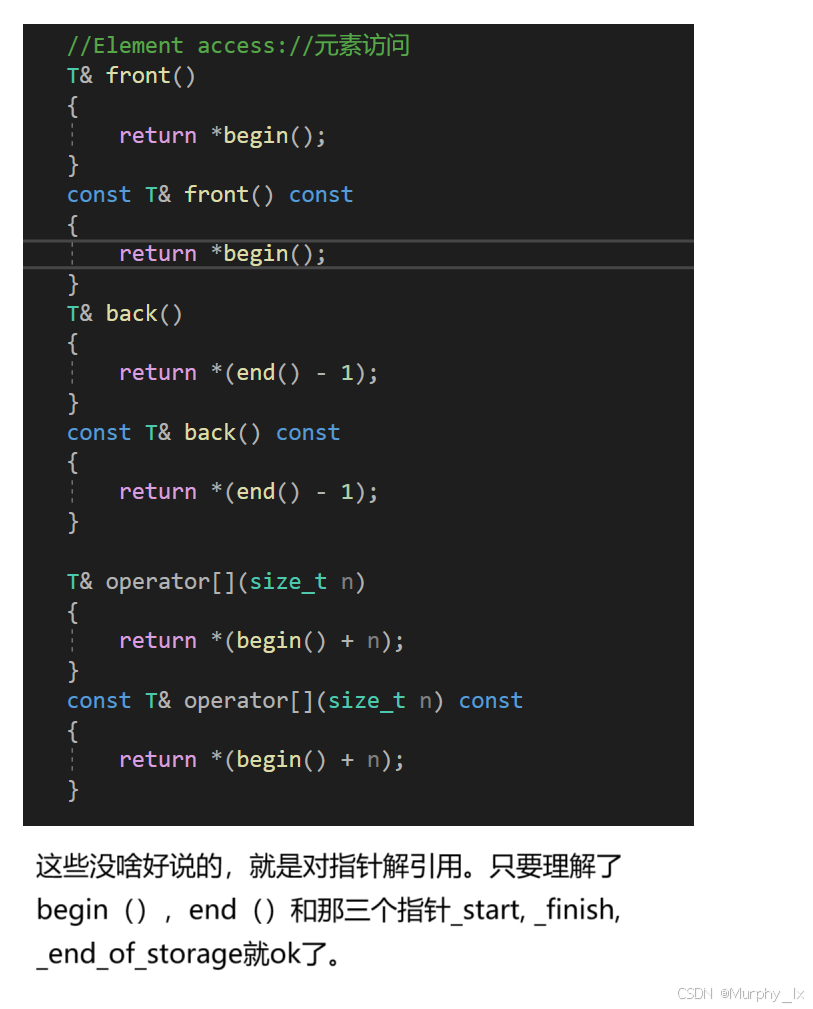
修改函数
